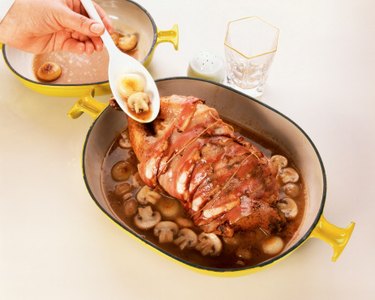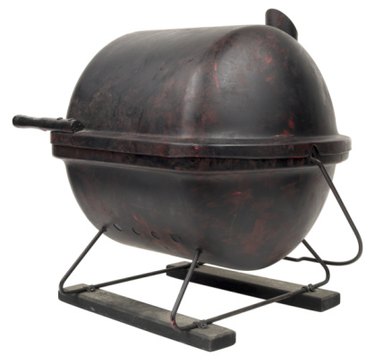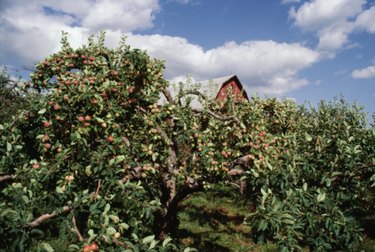
Bacon is a common breakfast food. As cooking styles and combinations of food have expanded, the use of bacon in food preparation has grown. Bacon is a processed meat product, smoked or cured. Different types of wood chips give smoked bacon a different flavor. There are also spices and glazes applied to bacon that give a different flavor to the smoked or cured pork. Apple, cinnamon, maple, and even jalapeno peppers are added to bacon to give a unique flavor to the pork. The dry cure for bacon is a hand rubbed pork belly. It's hung and then smoked before selling.
Bacon
Video of the Day

Bacon is a mass-produced pork product taken from the belly of the pig. A liquid cure solution plumps the pork before curing. The cure solution has sodium and phosphates that plump the meat when raw, then cause it to shrink when cooked. Cured bacon is not smoked. Liquid smoke and other flavorings mix with the cure solution giving a unique smoked flavor to the pork. Pork cures in a thermal heating unit, not a smoker. Once heated, the pork gets a rapid chilling, is pressed in a machine for a uniform shape, sliced and packaged for sale as bacon.
Video of the Day
Apple Wood Smoked Bacon

Smoking of Apple Wood Smoked Bacon uses actual apple wood chips. Apple wood chips are shaved pieces of tree dried, not burned green. If wood burns when green, the richness in flavor isn't as intense or aromatic. A pork slab weighs 9 to 12 lbs. Inside the smoker, smoldering apple wood chips fill the confined space with smoke that seeps into the pork meat. Good-quality smoked pork is often sliced thick. Shrinkage from smoked pork is minimal. Sodium and phosphates are not part of the curing process.
Artisanal Bacon
Artisanal bacon is a longer hands-on smoking process. The pork belly is not frozen; artisanal bacon begins with fresh pork bellies, giving a higher quality texture and flavor. Occasionally artisanal bacon is wet-cured, but traditionally the process is dry curing. A dry cure is a hands-on rubbing of spices, sugar, salt and curing salts. The dry rubbed pork is left to cure for up to a month and then slow-smoked over a wood fire. The slow smoke takes three days. Curing and smoking for a longer period increases the intensity of the flavor. One flavor of artisanal bacon is apple wood, which uses apple wood saw dust not apple chips.
Premium Bacon with Unique Flavor

The curing process and the method in which the pork is smoked determine the unique flavor of bacon. The gender of the pig along with age, breed and diet also determine the unique flavor of the bacon. Mass produced bacon where all pork bellies are frozen and processed in the same way varies greatly in flavor to artisanal bacon. Artisanal bacon is irregular in shape and uses only fresh pork. The texture of the meat as well as balance of sweet, smoke, salt defines premium bacon. Premium bacon is not too fat, too salty or too sweet.